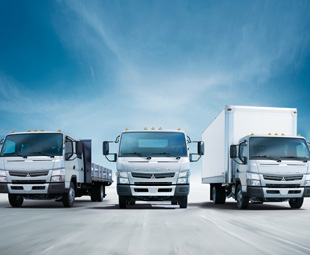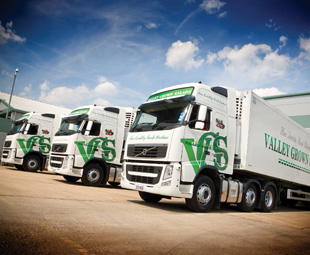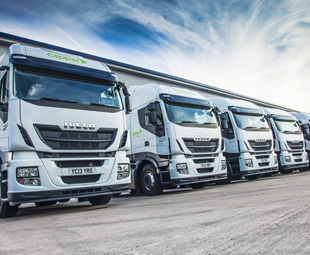More vehicles, more problems

Operating a fleet is a stressful undertaking. We identify the issues that are keeping fleet managers awake at night, and try to find out what can make their job a little easier
Each month, FOCUS is inundated with industry news releases. These paint a pretty telling picture of the current operating landscape. We’ve identified numerous “problem areas” from this – the kinds of issues that can keep a fleet manager awake at night …
So, in no particular order, let’s find out what the industry is dealing with.
Operating in Africa
Africa’s economic revolution is creating many opportunities. Andrew Robinson, CEO of the Kit Group, says it is becoming increasingly clear, however, that getting logistics right in Africa is a different game altogether. “The levels of complexity brought about by having 54 countries – all at differing stages of development and with different political sensibilities, legal systems, regulations and tax regimes – is staggering,” he notes.
Robinson suggests that trading zones can be useful in getting product to market as cheaply as possible and, in some sectors, operating within the bloc and understanding the rules can offset the customs duties in the Southern African Development Community (SADC) region altogether.
“Unfortunately, when things go wrong, and they will, even if it isn’t your fault, it can be very expensive and negatively impact on your ability to service your customers effectively,” Robinson says.
“In Africa there are no plug-and-play recipes for success. It is simply a question of getting the basics right, paying attention to all the little details, ensuring that you don’t make any expensive mistakes and having the right logistics partners.”
According to the recent World Bank 2015 Doing Business Report, South Africa is rated 100 out of 189 economies for ease of trading across borders.
 Bruce Marshall, country manager: Zambia, Zimbabwe and Malawi, of Maersk Line, says cross-border trade efficiency depends a lot on a country’s logistics capabilities and the state of infrastructure in the region.
Bruce Marshall, country manager: Zambia, Zimbabwe and Malawi, of Maersk Line, says cross-border trade efficiency depends a lot on a country’s logistics capabilities and the state of infrastructure in the region.
“South Africa ranks favourably in the overall World Bank Logistics Performance Index (LPI), at 34th; by comparison, Nigeria ranks 75th.” The index tracks customs, infrastructure, international shipment, logistics competence, tracking and tracing and timeliness.
Germany is the top logistics performer in the world in overall LPI. In terms of timeliness, South Africa scores 3,88 compared to Germany’s 4,36 and 3,62 in logistic competence compared to its 4,12.
South Africa currently scores 3,20 in the infrastructure category, which compares favourably with Malawi (3,04), Zambia (2,31) and Zimbabwe (2,25).
In terms of customs ratings in Africa, Zimbabwe scores a low 1,89, Zambia 2,54, Malawi 2,79 and South Africa 3,11.
“One of the challenges that many countries in Africa face during cross-border trade is customs clearance, with trucks having to wait for days while documents are processed,” says Marshall, suggesting that the development of rail infrastructure is a possible solution to this problem.
Technology and reducing costs
The ever-increasing barrage of operating costs is an aspect that needs no introduction. Fuel, maintenance, tolls, insurance and accidents are expensive and fleet managers need to be able to make use of the resources at their disposal to reduce these costs.
Using a tool like Fleet Recon can help extract maximum value from telematics data and other key management processes, to increase the productivity of fleets while reducing costs. Managing director of Fleet Recon, Tanya Clarke, explains that if a fleet investment is not managed correctly, it is a dormant investment.
“The Fleet Recon reports used to manage productivity also affect cost-savings. This analysis can save companies ten to 15 percent on their fleet costs.”
Another increasingly popular solution being used to avert financial and insurance losses is the adaptation of forward-facing cameras that monitor drivers and capture data of an accident or driving incident.
Intelligent Telematics operations director, Craig Lovell, says that, as the insurance sector becomes more technically aware, it is becoming critical to ensure that GPS accuracy and G-force measurement readouts are highly reliable, to prevent any challenges to the validity of data.
“Poor quality data faces the risk of being dismissed, with operators ultimately having to absorb the added costs. It’s important that companies carefully consider any camera investment to avoid potentially spiralling insurance costs,” he advises.
Some offerings on the market go a step further, adding increased safety and security features. Fleet Protect, for example, offers extra cameras for a view of the cargo and fuel tank, an open two-way communication line to speak to drivers and Alco Protect; a system linked to the ignition to prevent drunk driving.
Driver training, sobriety and fatigue
The shortage of drivers in South Africa (by as many as 3 000, according to Toni Fritz, head of vehicle and asset finance – Business at Standard Bank) is another key issue causing angst in the transport industry at the moment.
“Due to the shortage of skills, many transport operators take the credentials presented by new recruits on face value, without adequate verification of their skills,” she says.
“A large portion of fleet managers do not have the capacity to take their drivers to training and vehicle familiarisation courses, due to staff shortages. There is also the fear that skilled drivers will be poached by competitors.
 “There are signs, however, that the transport industry may have started turning the corner. There seem to be a number of initiatives from the industry, itself, to do something about the skills crisis. One of these is the Road Transport Management System (RTMS), of which driver training and development is one of the four pillars,” Fritz notes.
“There are signs, however, that the transport industry may have started turning the corner. There seem to be a number of initiatives from the industry, itself, to do something about the skills crisis. One of these is the Road Transport Management System (RTMS), of which driver training and development is one of the four pillars,” Fritz notes.
Drivers face incredible challenges including poor diet, extended working hours and, in many instances, substance dependency. The issue of correctly trained and professional drivers is one that cannot be stressed enough.
Last year, the South African police recorded 69 490 cases of drunk driving. The use of alcohol and drugs among truck drivers is also worrying in its prevalence. Says Rhys Evans, director at ALCO-Safe: “Alcohol is one of the primary culprits, but drug use, particularly of stimulants, is a growing problem. When mixed with alcohol, stimulants can have devastating consequences.”
Evans suggests that a comprehensive substance abuse programme, which includes on-going random testing and, importantly, an educational component for employees, is essential in reducing the dangers associated with substance abuse on the roads.
“By reducing substance abuse, drivers can become healthier, more alert and more responsible, cause fewer accidents and become more motivated and productive. Educating drivers on these benefits can greatly improve employee response to alcohol and drug testing policies,” he says.
Driver fatigue is also a big danger. “In South Africa, our drivers are paid per kilometre travelled; more kilometres driven equals more money. If we consider that drivers are generally not very well paid, then it is easy to say that they will travel until they, literally, can’t anymore,” says Grant Fraser, product and marketing director at MiX Telematics (Africa)
While driving hours are strictly regulated in countries such as America, Canada and Australia, the scenario in South Africa leaves our industry vulnerable. “It leads to a critical concern in the fleet sector that results in loss of life, revenue and good drivers,” says Fraser.
“Companies should ensure that they provide adequate driver training and implement a proper screening process. In addition, investing in fleet management systems to monitor driver behaviour, to ensure that they are adhering to proper rest periods, is also a possibility,” he advises.
Fraud and crime
Crime has long been a reality in South Africa and the tough economic and social conditions our country is currently dealing with are exaserbating the situation.
“Official crime statistics show a 12,3 percent increase in carjacking to 11 221 reported cases, while our own truck hijackings stats increased by 16 percent in the last financial year. This aligns with similar figures released by the Road Freight Association of 1 150 truck hijackings across the industry during the same period. The escalation is rapid and significant,” says John Edmeston, Global CFO of Cartrack Holdings.
“Our experience and the findings of the report are consistent with criminal motivation theory, which suggests that economic stress causes an increase in criminal behaviour. Past experience shows that during the financial crisis of 2008/9, truck hijackings in South Africa soared by 61 percent, when compared with South African Police Service (SAPS) stats for 2006/7. During the recovery years of 2011/12, the incidents fell by 42 percent,” Edmeston adds.
Fuel card fraud is another type of crime fleet managers have had to deal with for a while now. According to Standard Bank, levels of fuel card fraud are not at epidemic levels, but it still requires vigilance. Transaction authorisation systems can help, says the bank. These automatically decline any transaction that falls outside certain parameters – such as filling up more than the vehicle’s tank capacity, or more than once within a certain time frame.
Vehicle fitness
In an attempt to keep vehicle maintenance costs to a minimum, high-quality replacement vehicle parts (priced at a premium) often fall by the wayside with favour going to cheaper alternatives. The short-term saving can turn out to be dangerous and more expensive in the long run, however.
Fred Evans, suspension expert and managing director of Polyflex Seals, suggests that truck operators carefully select components – like replacement suspension parts – from reputable suppliers only.
“This follows a spate of failures caused by inferior quality bushings that are being sold as ‘high quality’ polyurethane replacement parts. This is of particular concern for the industry, as polyurethane bushings are used in heavy-duty applications to protect the suspension and give truck operators the benefit of reduced service intervals and better wear life.
“In the southern African transport industry the use of polyurethane bushings and components are estimated to save transport companies millions of rand in tyre wear as a result of increased service life of suspension systems,” he says.
The future
The last few years have seen much speculation and concern around various proposed laws and how these will affect the transport industry.
The current consignor/consignee legislation, while intentionally good for the industry, has been criticised for being too complicated to be truly workable. Industrial weighing company, Sasco Africa, is confident it has a solution to ease compliance.
A highly secure and cost-effective cloud-based solution, Sasco PAW (Permissible Axle Weights) enables transporters to maintain a complete database of their trucks, trailers and customer details on a load-by-load basis to seamlessly compute and transmit truck and trailer combination PAWs to consignors.
The system can be directly integrated with consignor weighbridge systems through Sasco’s weighbridge software, which has been released recently.
Sasco PAW is operated on an expandable database system with eleven different user levels. User Level 0 is free, allowing for up to six truck, trailer and customer combinations. At User Level 10, a single-user license can cater for up to 100 000 such combinations.
Published by
Focus on Transport
focusmagsa




